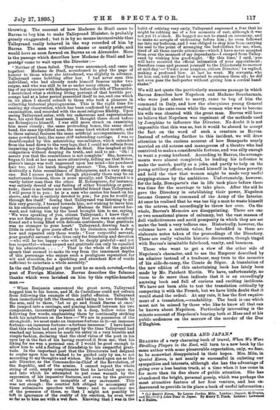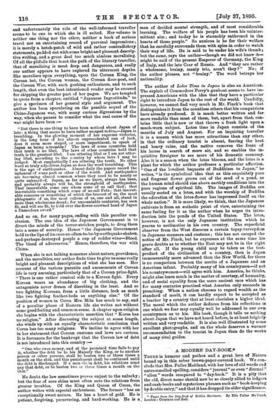OF COREA AND JAPAN.*
READERS of a very charming book of travel, When We Were Strolling Players in the East, will tarn to a new book by the same author with some pleasurable expectation, only, we fear, to be somewhat disappointed in their hopes. Mrs. Miln, in Quaint Korea, is not nearly so successful in enlisting our sympathies and interests, although she has the advantage of going over a less beaten track, at a time when it has come in for more than its due share of public attention. She has abandoned the bright, personal gossip, which was perhaps the most attractive feature of her first venture, and has en- deavoured to provide in its place a book of useful information ; • (L) Quaint Korea. By in Jordan Miln. London: Osgood, Maly:tine, and Oo.—(2.) Lotos Time vs Japan. By Henry T. hack, London ; Lawrence s-d Baca.
and unfortunately the role of the well-informed traveller seems to be one to which she is ill suited. Her volume is neither one thing nor the other, neither a book of serious travel nor an entertaining record of personal impressions ; it is merely a hotch-potch of wild and rather contradictory statements, padded out with some bright and pleasant descrip- tive writing, and a great deal too much aimless moralising. Of all the pitfalls that beset the path of the literary traveller, that of moralising is most deep and dangerous, and really our author appears to have explored its uttermost depths. She moralises upon everything, upon the Corean King, the Corean hat, the Corean woman, the Corean door-post, and the Corean War, with such gushing enthusiasm, and to such length, that even the best intentioned reader may be excused for skipping the greater part of her pages. We are tempted to quote from a chapter, entitled "Japanese Ingratitude," to give a specimen of her general style and argument. The author has been speculating on the possible sequel of the Chino-Japanese war, with many curious digressions by the way, when she pauses to consider what the real cause of the war might have been :—
" But there is one thing to have been noticed about Japan of lath : a thing that seems to have rather escaped notice,—Japan is trembling. In the glowing moment of her supreme victories, in the long hour of her almost unprecedented run of luck, does it seem more stupid, or more impertinent, to speak of Japan as being a-tremble ? The laws of some countries hold that truth is no libel. The laws of other countries hold that truth is the greatest libel. I am uttering libel or I am not utter- ing libel, according to the country by whose laws I may be judged. Most emphatically I am uttering the truth. No other word so truly adjectives Japan as does the word trembling. This is the age of earthquakes. Almost daily the papers record the upheaval of some part or other of the world. And earthquakes are becoming almost common where they used to be nearly or quite unheard-of. Japan, as far as we know, always has been, and probably always will be, the stronghold of earthquakes. That inscrutable some one whom some of us call God; that inscrutable something which some of us call Fate ; that inscrut- able someone or something of which the bravest of us, the moat phlegmatic of us, the most callous of us, one and all, stand in more than wholesome dread ; for uncountable centuries, has seen fit, and will see fit, to hold over the flower-crowned head of Japan a Damoclean sword."
And so on, for many pages, ending with this peculiar con- clusion. The one idea of the Japanese Government is to divert the minds of the terror-stricken people, to drug them into a sense of security. Hence " the Japanese Government hold to the lips of its once-so-often-to-be-by-earthquake-shaken- and-perhaps-destroyed people a cup of redder wine—Blood. The blood of adversaries." Hence, therefore, the war with China.
When she is not talking nonsense about nature, providence, and the moralities, our author finds time to give us some really bright and pleasant descriptions of what she has seen. Her account of the various pursuits and amusements of Corean life is very amusing, particularly that of a Corean prize-fight. "There is one rather comical side to a Korean fight. Every Korean wears an abundance of big clothing, and the antagonists never dream of disrobing in the least. And so two fighting Koreans, from a little distance, look as much like two fighting feather-beds as anything else." Of the position of women in Corea Mrs. Miln has mach to say, and of a peculiar phase of Eastern life she writes not without some good feeling and common-sense. A chapter upon religion she begins with the characteristic assertion that " Korea has no religion." After discussing the subject at some length, she winds up with an equally characteristic conclusion that Corea has too many religions. We incline to agree with her in her statement that Corean customs and laws are curious. It is fortunate for the bankrupt that the Corean law of debt is not introduced into this country :- "One who owes money, and at the promised time fails to pay it, whether the debt be to his Majesty the King, or to another person or other persons, shall be beaten two or three times a month on the shin, and this punishment shall be continued until the debt is discharged. If a man (lie in debt, his relations must pay that debt, or bo beaten two or three times a month on the shin."
No doubt the law sometimes proves unjust to the unlucky ; but the fear of sore shins must often save the relations from greater troubles. Of the King and Queen of Corea, the author writes with especial enthusiasm. The former "has an exceptionally sweet nature. He has a heart of gold. He is
• Pages from the Day-Book of Bethia Hardaere. By Ella Fuller Mallard. patient, forgiving, persevering, and hard-working. He is a. London : Chapman and Hell.
man of decided mental strength, and of most considerable learning. The welfare of his people has been his uninter- mittent aim ; and to-day he is staunchly enthroned in the hearts of those people." So anxious is he for their welfare that he carefully surrounds them with spies in order to watch their way of life. He is said to be under his wife's thumb ; but the same, says the author—though we did not know it— might be said of the present Emperor of Germany, the King of Italy, and the late Czar of Russia. And "they are rather a wholesome, brainy, manly trio, aren't they ? " No ; if the author pleases, not " brainy." The word betrays her nationality.
The author of Lotos Time in Japan is also an American. The exploit of Commodore Perry's gunboat seems to have im- pressed Americans with the idea that they have a particular right to introduce Japan to the rest of the world. Candidly, however, we cannot find very mach in Mr. Finck's book that distinguishes it from the countless others that his compatriots have already produced. It is much better written and far more readable than most of them, but, apart from that, con- tains little that is new or that throws a fresh light upon a much-worn subject. Lotos time in Japan consists of the months of July and August. For an inquiring traveller it is a season which has more attractions than any other, in that the ordinary tourist is absent, fearing the heat and heavy rains, and the native removes the front of his house in search of more air, and so enables the in- quisitive foreigner to see more of his domestic economy. Also it is a season when the lotos blooms, and the lotos is a plant for which the author professes a particular affection. "One of the loveliest bequests of Buddhism to Japan," he writes, " is the symbolical idea that as this exquisitely pure and fragrant flower grows out of the mud of a pond, so the human mind should rise above earthly conditions into the pure regions of spiritual life. The images of Buddha are usually seated on a lotos, and with the worship of Buddha the adoration of the lotos-flower has impressed itself on the whole nation." It is more likely, we think, that the Japanese cultivate it from an aesthetic point of view, entertaining the same feeling for it as the author when he urges its intro- duction into the ponds of the United States. The lotos, however, is not the only Japanese institution which he yearns to acclimatise in his own country. The superficial observer from the West discerns a certain topsy-turveydom in Japanese manners and customs ; this has not escaped the notice of Mr. Flack, but he expresses at the same time his grave doubts as to whether the East may not be in the right after all. If the young child may be taken as the test- product of the civilisation of a country, then is Japan immeasurably more advanced than the New World, for there is no comparison between the merits of a Japanese and an American infant. Probably many of his countrymen—if not his countrywomen—will agree with him. America, he thinks, might also learn much in the matter of courtesy, of humanity, and of social equality from the more ancient race which has for many centuries practised what America only succeeds in preaching. When a nation chooses to regard wealth as the standard of merit, it can hardly expect to be accepted as a teacher by a country that at least cherishes a higher ideal. The moral which the author deduces from his reflections is one which we fear may equally well be addressed to our own countrymen as to his. His book, though it tells us nothing about Japan that we have not heard before, is at least brightly written and very readable. It is also well illustrated by some excellent photographs, and on the whole deserves a warmer recommendation to the tourist in Japan than do the works of many rival guides.



































 Previous page
Previous page